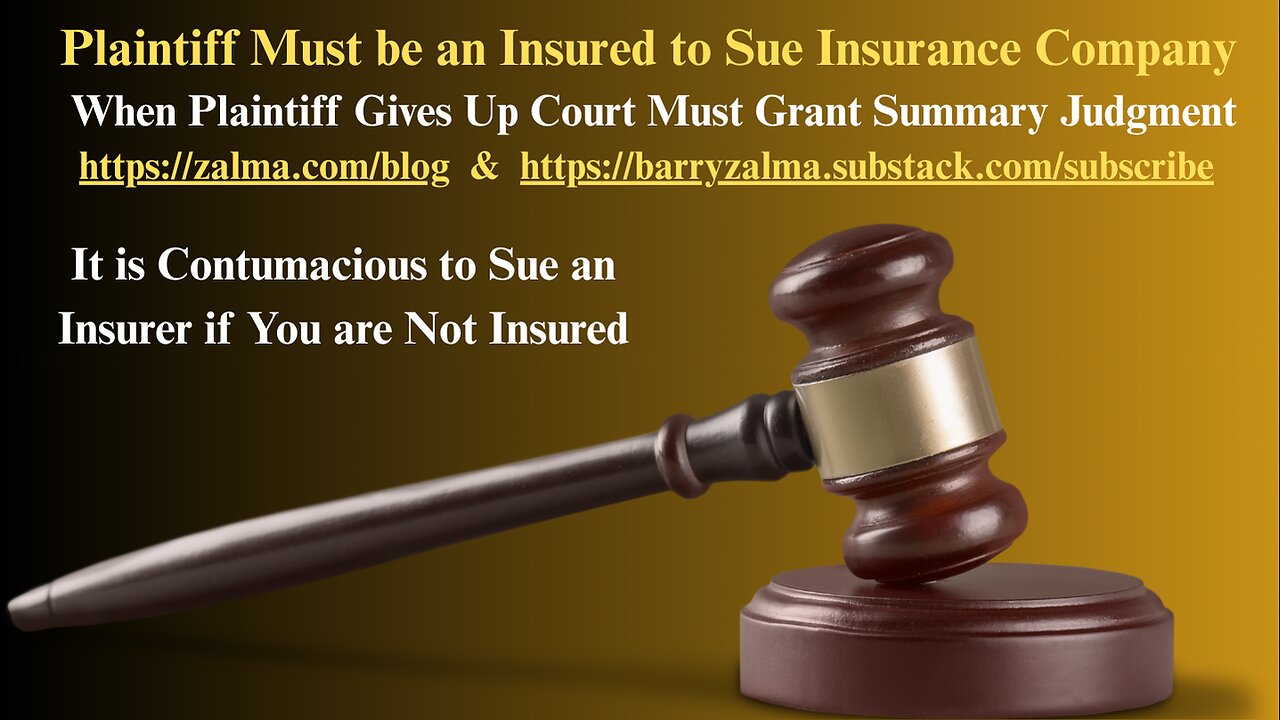Premium Only Content

Plaintiff Must be an Insured to Sue Insurance Company
When Plaintiff Gives Up Court Must Grant Summary Judgment
Post 5154
It is Contumacious to Sue an Insurer if You are Not Insured
Defendant American National filed a motion for summary judgment because Plaintiff is not a named or third-party beneficiary of the Policy. Defendant contends that because Plaintiff is not covered by the Policy, Plaintiff cannot prove that Defendant breached the Policy or demonstrated bad faith under La. R.S. 22:1973 and 22:1892. In support of this contention, Defendant argued that the Policy only covers the “Named Insured/Mortgagee” of the property, Magee Holdings, LLC, and that the Policy does not name Plaintiff as an insured or a third-party beneficiary.
In Hannah Guillotte v. American National Property And Casualty Company, Civil Action No. 23-00931-BAJ-RLB, United States District Court, M.D. Louisiana (July 16, 2025) Plaintiff, the alleged insured, initially asserted that Defendant, the insurer, breached an insurance policy by failing to timely pay Plaintiff sufficient funds after Plaintiffs property sustained damage from Hurricane Ida. Plaintiff also sought to recover bad faith damages, penalties, and attorney's fees from Defendant.
DISCUSSION
Evidence revealed that Magee Holdings is the insured specified in the policy and that “[t]he mortgagor is not a named insured under the policy.” Plaintiff, whose counsel saw the error, filed a Notice Of No Opposition, in which Plaintiff concluded it does not oppose the Court granting Defendant's Motion.
Federal Rule of Civil Procedure 56 provides that the Court may grant summary judgment only “if the movant shows that there is no genuine dispute as to any material fact and the movant is entitled to judgment as a matter of law.” FED. R. Civ. P. 56(a).
Where the record taken as a whole could not lead a rational trier of fact to find for the non-moving party, there is no genuine issue for trial.
A party seeking to recover under an insurance policy has the burden of pleading and proving that his claim falls within the terms and conditions of the policy. This includes proving that the policy covers the alleged insured. A breach of contract claim requires, at minimum, the existence of a contract among the parties. To recover pursuant to the statute a plaintiff must first have a valid, underlying, substantive claim upon which insurance coverage is based.
Here, the unrebutted summary judgment evidence conclusively establishes that the Policy does not cover Plaintiff. Having failed to produce any summary judgment evidence regarding the existence of a contract with Defendant, Plaintiffs breach of contract claim and claims under Louisiana statutes must be dismissed.
ZALMA OPINION
Suing an insurance company with whom the plaintiff has no relationship is ridiculous and deserves both a Notice Of No Opposition and a judgment in favor of the insurer. The Notice of No Opposition the plaintiff and her counsel may have avoided contempt while the honorable thing to do would be to voluntarily dismiss the suit rather than causing the court to spend the time to review the pleadings and issue an order granting summary judgment.
(c) 2025 Barry Zalma & ClaimSchool, Inc.
Please tell your friends and colleagues about this blog and the videos and let them subscribe to the blog and the videos.
Subscribe to my substack at https://barryzalma.substack.com/subscribe
Go to X @bzalma; Go to Barry Zalma videos at Rumble.com at https://rumble.com/account/content?type=all; Go to Barry Zalma on YouTube- https://www.youtube.com/channel/UCysiZklEtxZsSF9DfC0Expg; Go to the Insurance Claims Library – https://lnkd.in/gwEYk.
-
 7:11
7:11
Insurance Law
12 days agoConvicted Insurance Fraud Sentence Stands
291 -
 LIVE
LIVE
meleegames
1 hour agoSONG REQUESTS CLOSED - Melee Music - Beat Hazard 3 - Devil Inside
106 watching -
 LIVE
LIVE
GritsGG
46 minutes ago#1 Most Warzone Wins 4015+!
88 watching -
 37:06
37:06
Camhigby
3 hours ago $8.01 earnedI Was Stalked By DRONE At Dearborn MOSQUE
22.9K19 -
 LIVE
LIVE
Biscotti-B23
4 hours ago🔴 LIVE STREAM ENDS WHEN I GET 100 WINS 🥵 INVINCIBLE VS CLOSED ALPHA
62 watching -
 12:38
12:38
Timcast
1 day agoJasmine Crocket HUMILIATED By CNN To HER FACE Over Epstein LIE | Tim Pool
94.4K69 -
 19:32
19:32
MetatronHistory
21 hours agoWas Nazism Left Wing or Right Wing? An Answer From History
15.7K38 -
 1:54:20
1:54:20
Mally_Mouse
21 hours ago🌶️ 🥵Spicy BITE Saturday!! 🥵🌶️- Let's Play: Human Fall Flat
52.6K3 -
 4:36
4:36
GreenMan Studio
3 hours agoTHE RUMBLE COLLAB SHOW EP. 5 W/Greenman Reports
223 -
 LIVE
LIVE
ShitShow Gaming
5 hours agoOUTLAST 2 IN 2025. . . | #WWP #horrorgames #multistream
15 watching